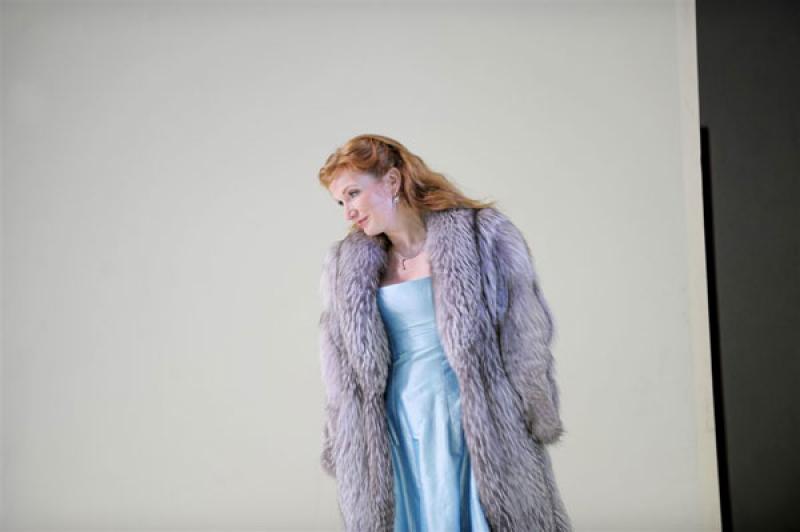Anne Schwanewilms, Roger Vignoles, Wigmore Hall | reviews, news & interviews
Anne Schwanewilms, Roger Vignoles, Wigmore Hall
Anne Schwanewilms, Roger Vignoles, Wigmore Hall
Perfect Schumann follows idiosyncratic Debussy as the great German soprano teams up with a master song-pianist

So we glide between seasons from one communicative diva giving her all in a vast space to another casting spells in intimate surroundings. While Joyce DiDonato, not perhaps one of the world’s great voices but certainly a great performer, was captivating the Proms multitudes on Saturday night, the Wigmore Hall’s concert year sidled in with Bryn Terfel and Simon Keenlyside, no low-key singers.
Lieder, yes, but chansons? Would her French be up to the clotted symbolism Debussy wrote himself for some of his most dreamlike music in his early Proses Lyriques? It hadn’t been clear some years back in a compelling but unidiomatic Barbican performance of Berlioz’s Les nuits d’été and strictly speaking it wasn’t here, either. The diction could be blurred in the interest of tonal colour and interior perspectives. But the sense, as far as Debussy allows in his dream, sea, flower and evening-in-the-city scapes, came across in the subtlest of shifts: reduced to a sliver for the passing of life in "De rêve", girt with silver armour as he invokes the knights of the grail (Wagner’s Parsifal was a fresh obsession at the time).
 The bizarre invocation to "redeeming hands" to free the singer of the destructive sun brought a lethal edge to the nightmare of “Des fleurs" and we were taken on a magical mystery tour where the pulse of urban Sunday frolics slows to night and sleep. Roger Vignoles (pictured right by Ben Ealovega) was Schwanewilms’ alchemical partner, conjuring melodies out of thin air and darkening the canvas with authority whenever Debussy’s favourite whole-tone scale slithers into the picture.
The bizarre invocation to "redeeming hands" to free the singer of the destructive sun brought a lethal edge to the nightmare of “Des fleurs" and we were taken on a magical mystery tour where the pulse of urban Sunday frolics slows to night and sleep. Roger Vignoles (pictured right by Ben Ealovega) was Schwanewilms’ alchemical partner, conjuring melodies out of thin air and darkening the canvas with authority whenever Debussy’s favourite whole-tone scale slithers into the picture.
More forward diction for Schumann’s Op. 39 Liederkreis placed us – with stylistic rightness – on firmer ground, but an even higher supernatural plane: the Germany of plausible scenes in mostly nocturnal landscapes, usually with a sting in the tail.
The vocal line could be wrought with sustained enchantment in a song as purely bewitching as “Mondnacht”, bracketed by Vignoles with drops of moonlight that descend into the earth at the end. But while Schwanewilms’s trademark white notes drew us into strange worlds, there were also sudden threats like a dagger through velvet. A touch of steel, fluidly evolved, in the Loreley who lures the gallant knight in the forest to his doom; the hypnotic marriage of darker tones with archaic piano line which yokes together a centuries-old knight in a castle with the weeping bride in a marriage-party down on the Rhine; the depth of sorrow in a song which is only surface-cheerful.
In a sequence where both artists weighed the significance of every note, Schumann the modernist was above all highlighted by each in the creepy warnings at twilight (“Zwielicht”), a stunning last stanza by the ever-surprising poet Eichendorff ending in utter bleakness: “Much can go lost in the night – be wary, watchful, on your guard”. I’ve never felt a duo partnership plumb so many depths with a lighter touch in a romantic song cycle. Perfection, in short, the ideal marriage of head and heart.
rating
Share this article
The future of Arts Journalism
You can stop theartsdesk.com closing!
We urgently need financing to survive. Our fundraising drive has thus far raised £49,000 but we need to reach £100,000 or we will be forced to close. Please contribute here: https://gofund.me/c3f6033d
And if you can forward this information to anyone who might assist, we’d be grateful.

Subscribe to theartsdesk.com
Thank you for continuing to read our work on theartsdesk.com. For unlimited access to every article in its entirety, including our archive of more than 15,000 pieces, we're asking for £5 per month or £40 per year. We feel it's a very good deal, and hope you do too.
To take a subscription now simply click here.
And if you're looking for that extra gift for a friend or family member, why not treat them to a theartsdesk.com gift subscription?
more Classical music
 From Historical to Hip-Hop, Classically Black Music Festival, Kings Place review - a cluster of impressive stars for the future
From quasi-Mozartian elegance to the gritty humour of a kitchen inspection
From Historical to Hip-Hop, Classically Black Music Festival, Kings Place review - a cluster of impressive stars for the future
From quasi-Mozartian elegance to the gritty humour of a kitchen inspection
 Shibe, LSO, Adès, Barbican review - gaudy and glorious new music alongside serene Sibelius
Adès’s passion makes persuasive case for the music he loves, both new and old
Shibe, LSO, Adès, Barbican review - gaudy and glorious new music alongside serene Sibelius
Adès’s passion makes persuasive case for the music he loves, both new and old
 Anja Mittermüller, Richard Fu, Wigmore Hall review - a glorious hall debut
The Austrian mezzo shines - at the age of 22
Anja Mittermüller, Richard Fu, Wigmore Hall review - a glorious hall debut
The Austrian mezzo shines - at the age of 22
 First Person: clarinettist Oliver Pashley on the new horizons of The Hermes Experiment's latest album
Compositions by members of this unusual quartet feature for the first time
First Person: clarinettist Oliver Pashley on the new horizons of The Hermes Experiment's latest album
Compositions by members of this unusual quartet feature for the first time
 Gesualdo Passione, Les Arts Florissants, Amala Dior Company, Barbican review - inspired collaboration excavates the music's humanity
At times it was like watching an anarchic religious procession
Gesualdo Passione, Les Arts Florissants, Amala Dior Company, Barbican review - inspired collaboration excavates the music's humanity
At times it was like watching an anarchic religious procession
 Classical CDs: Camels, concrete and cabaret
An influential American composer's 90th birthday box, plus British piano concertos and a father-and-son duo
Classical CDs: Camels, concrete and cabaret
An influential American composer's 90th birthday box, plus British piano concertos and a father-and-son duo
 Cockerham, Manchester Camerata, Sheen, Martin Harris Centre, Manchester review - re-enacting the dawn of modernism
Two UK premieres added to three miniatures from a seminal event of January 1914
Cockerham, Manchester Camerata, Sheen, Martin Harris Centre, Manchester review - re-enacting the dawn of modernism
Two UK premieres added to three miniatures from a seminal event of January 1914
 Kempf, Brno Philharmonic, Davies, Bridgewater Hall, Manchester review - European tradition meets American jazz
Bouncing Czechs enjoy their Gershwin and Brubeck alongside Janáček and Dvořák
Kempf, Brno Philharmonic, Davies, Bridgewater Hall, Manchester review - European tradition meets American jazz
Bouncing Czechs enjoy their Gershwin and Brubeck alongside Janáček and Dvořák
 Solomon, OAE, Butt, QEH review - daft Biblical whitewashing with great choruses
Even a top soprano and mezzo can’t make this Handel paean wholly convincing
Solomon, OAE, Butt, QEH review - daft Biblical whitewashing with great choruses
Even a top soprano and mezzo can’t make this Handel paean wholly convincing
 Two-Piano Gala, Kings Place review - shining constellations
London Piano Festival curators and illustrious friends entertain and enlighten
Two-Piano Gala, Kings Place review - shining constellations
London Piano Festival curators and illustrious friends entertain and enlighten
 Echo Vocal Ensemble, Latto, Union Chapel review - eclectic choral programme garlanded with dance
Beautiful singing at the heart of an imaginative and stylistically varied concert
Echo Vocal Ensemble, Latto, Union Chapel review - eclectic choral programme garlanded with dance
Beautiful singing at the heart of an imaginative and stylistically varied concert
 Scott, Irish Baroque Orchestra, Whelan, RIAM, Dublin review - towards a Mozart masterpiece
Characteristic joy and enlightenment from this team, but a valveless horn brings problems
Scott, Irish Baroque Orchestra, Whelan, RIAM, Dublin review - towards a Mozart masterpiece
Characteristic joy and enlightenment from this team, but a valveless horn brings problems

Add comment